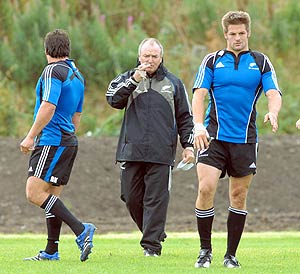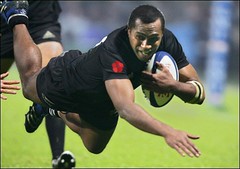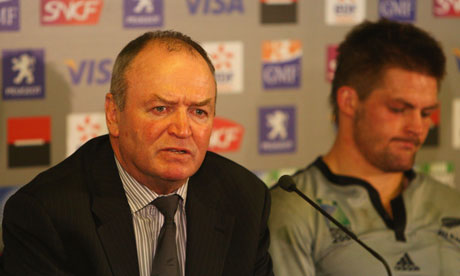You can have a look at Graham Henry's Wikipedia full profile here along with his other achievements with Auckland, the Blues, Wales and the British & Irish Lions. But what I would like to focus here is on his achievements as All Blacks coach for the last 8 years which I'll spell out in raw stats firstly:
Record (courtesy of scrum.com):
Games coached: 103
Won: 88
Lost: 15
Drawn: 0
Win Percentage: 85.43%
Other notable coaches:
Fred Allen - 100%, John Mitchell - 83.92%, John Hart - 76.82%, Laurie Mains - 69.11%
Points scored: 3602
Points conceded: 1534
Tries scored: 419
Honours:
Bledisloe Cup holder - 2004-2011
4 x Tri Nations titles - 2005, 2006, 2008, 2010
3 x Grand Slam (beating all the Home Nations) - 2005, 2008 & 2010
1 x British & Irish Lions series win - 2005
1 x Rugby World Cup - 2011
 |
| Favourite shot of Henry by the media. |
But in the world of sport outside of America, we know that sport transcends statistics and numbers.
 |
| Henry at training with Captain Fantastic. |
Henry with his connections to the top brass at the NZRU and long coaching experience was an instant shoe-in for the job and just before Christmas in 2003, was announced as the new All Blacks coach. Soon, Steve Hansen and Wayne Smith were asked to be his assistant coaches.
One of the things Henry sought to bring back was the All Blacks' old forward dominance which had disappeared with the free-running how-many-tries-can-you-score rugby that the Super 12 had brought.
 |
| Captain Tana against the Pumas, Hamilton 2004 |
So for the All Blacks' first squad of 2004, in came Tony Woodcock and Carl Hayman in the front row, Simon Maling and Keith Robinson in the locks, Jono Gibbes and Xavier Rush in the loose forwards - supposed hard men who would add physicality to what was apparently a soft forward pack.
Meanwhile, Tana Umaga was announced as captain replacing Reuben Thorne with Richie McCaw as his deputy.
 |
| King Carlos tackling Charlie Hodgson, Dunedin |
Against the then-world champions, England in Dunedin, the All Blacks started with a bang and showed glimpses of a return of that old forward domination in a 36-3 win. Granted, England were missing quite a number of their World Cup heroes like Jonny Wilkinson and the now-retired, Martin Johnson, but it was still a very impressive win. They followed that up with an equally impressive 36-12 win in the 2nd test against England in Auckland.
After further tests against Argentina and the Pacific Islanders, the All Blacks took on the Wallabies in a rain-sodden Bledisloe Cup encounter in Wellington. The team in black were imperious in difficult conditions, winning 16-7.
 |
| Marius Joubert scored 3 past the All Blacks, Joburg |
 |
| Rokocoko at his very best, Cardiff, 2004 |
The All Blacks just about hung on against the Welsh in a scintillating game. The pressure on Henry was huge after the 26-25 win in Cardiff but the response by the team in black was huge. Against the French in the packed Stade de France, the All Blacks put in their best display of the season thumping the French 45-6.
 |
| McCaw taking on the British & Irish Lions, 2005 |
 |
| Clinching the Grand Slam, 2005 |
They vanquished World Cup winning coach Sir Clive Woodward's British & Irish Lions 3-0, retained the Tri Nations and Bledisloe Cup despite losing to the Springboks in Cape Town, and won only their 2nd Grand Slam in history. Dan Carter emerged as the best player in world rugby and the All Blacks were the most complete team in world rugby with a dominant forward pack and tremendous depth in the forwards and backs.
 |
| Sivivatu at his very best, 2006. |
Even with Richie McCaw finally taking over from Tana Umaga as captain in the summer, the All Blacks continued their imperious form into 2006. Again they would lose only 1 test. Again it was against the Springboks in Rustenburg, a side who would prove to be Graham Henry's greatest nemesis during his time - won 12, lost 8, easily Henry's bogey team especially in the Republic where Henry would win only 4 out of 10 games there. They made up for the loss in Rustenburg with another superb performance during the autumn tour in England, France and Wales.
 |
| Yet another choke, RWC 2007, Cardiff |
 |
| The inquest after the Cardiff disaster, 2007 |
It was only natural for New Zealanders to expect a change in coach after a failed World Cup campaign - it had happened every single time since 1991.
 |
| The three wise men of New Zealand rugby |
Thus, many were surprised, shocked when it was announced in late 2007 that Henry would be retained as All Blacks head coach along with Smith and Hansen.
There were fans who were happy with the decision including myself, who thought the chopping and changing of coaches handicapped rather than helped the All Blacks when it came to winning the World Cup. But there were also fans who weren't happy with the decision especially from Canterbury who were banking on Robbie Deans to take the top job - many even defected to the Wallabies when Deans was announced as the new Wallabies coach.
 |
| Nick Evans: not a fan of the Henry regime. |
 |
| Big Brad back at his 2nd home and lapping up the cheers. |
The experience of Carter, McCaw and Thorn would be necessary as the All Blacks were set to blood plenty of new players for the season. After a shaky start in the Tri Nations which saw them lose to South Africa for the first time ever in Dunedin and Australia in Sydney with undoubtedly the worst performance by a Henry-coached team, the relatively inexperienced All Blacks bounced back to beat the Wallabies in Auckland and then went to South Africa to take a rare win in the Republic. It set up the Tri Nations and Bledisloe Cup decider in Brisbane which the All Blacks won convincingly.
Later in the season, the All Blacks would add their 2nd Grand Slam in 3 seasons to cap off a surprisingly successful season.
 |
| France win their first test at the former House of Pain, 2009. |
 |
| Dagg runs away to score winning try in Joburg, 2010 |
 |
| All Blacks celebrate Grand Slam win, 2010 |
 |
| Despite this early setback, Henry et. al never panicked. |
So to 2011 and another Rugby World Cup year. And this time it would be at home in New Zealand in front of the so-called stadium of 4 million. The All Blacks would use the Tri Nations - and Fiji - to warm up for yet another attempt to end their long World Cup drought. In a way, it was a successful warm-up - yes they lost the Tri Nations in a truncated campaign but kept the Bledisloe Cup for another year and also found out that Richard Kahui and Israel Dagg were fit for the Rugby World Cup.
The All Blacks may have lost two tests in a row for the first time since 2008 but they knew that they would be given a clean sheet when the Rugby World Cup kicked off. The All Blacks were their usual impressive selves in the pool games and easily booked their place in the quarterfinals with a thumping win over France. They used the forward domination that the coaching staff had worked so hard to build over the last 8 years to get past Argentina and Australia.
 |
| Tonga takes on the best of SBW, 2011 RWC |
Then came the Final which we've gone over many a time. Thankfully for Ted, he got the outcome he wanted and became the first coach to win the World Cup for New Zealand since Sir Brian Lochore in 1987. Many may not have liked his selections at times but many more would not dare say that Ted and his two assistants didn't deserve this achievement.
 |
| Kieran Read v Morgan Parra, 2011 RWC Final |
 |
| Ted's finest hour - McCaw lifting Bill |
Ted will be remembered as the coach who ended New Zealand's long World Cup drought. But he should also be remembered as someone who returned pride to the jersey as well as the brutal domination which the All Blacks built their reputation on.
Whatever happens with Ted in the future, Ted will be forever appreciated by New Zealanders for years to come and his achievements will be looked back upon fondly.
 |
| Legend. What a way to bow out. |

Sir Fred Allen might have a statistically higher win/loss ratio, however he only coached the All Blacks in 14 Tests, Graham Henry 103 tests.
ReplyDelete